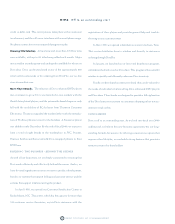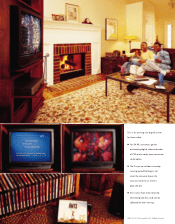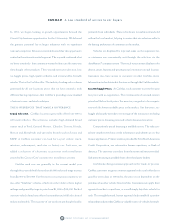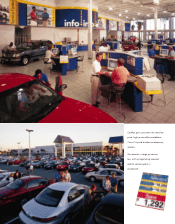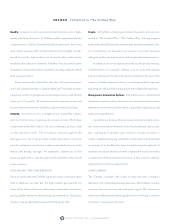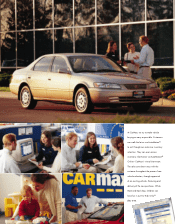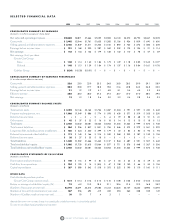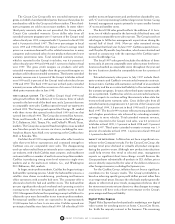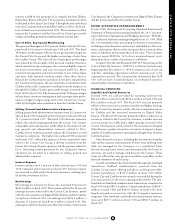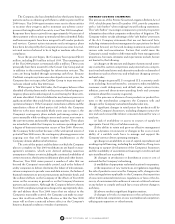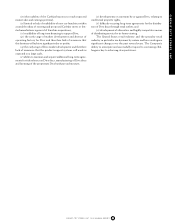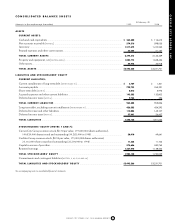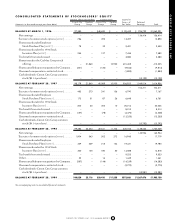CarMax 1999 Annual Report Download - page 28
Download and view the complete annual report
Please find page 28 of the 1999 CarMax annual report below. You can navigate through the pages in the report by either clicking on the pages listed below, or by using the keyword search tool below to find specific information within the annual report.
During fiscal 1999, the CarMax Group acquired the Toyota
franchise rights and the related assets of Laurel Automotive
Group, Inc.; the franchise rights and the related assets of Mauro
Auto Mall, Inc.; the franchise rights and the related assets of
Nissan of Greenville, Inc.; and the Mitsubishi franchise rights and
the related assets of Boomershine Automotive, Inc. for a total of
$49.6 million. The acquisitions were financed through cash pay-
ments totaling $41.6 million and the issuance of two promissory
notes totaling $8.0 million. Costs in excess of the acquired net
tangible assets, which are primarily inventory, have been recorded
as goodwill and covenants not to compete.
Receivables generated by the consumer finance operations
are funded through securitization transactions that allow the
operations to sell their receivables while retaining a small interest
in them. The Circuit City Group’s finance operation has a master
trust securitization facility for its private-label credit card that
allows the transfer of up to $1.38 billion in receivables through
both private placement and the public market. A second master
trust securitization program allows for the transfer of up to $1.75
billion in receivables related to the operation’s bankcard pro-
grams. Receivables securitized under the master trust facilities
totaled $2.76 billion at February 28, 1999. In fiscal 1996, Circuit
City Stores, Inc. initiated an asset securitization program on
behalf of the CarMax Group. At the end of fiscal 1999, that pro-
gram allowed for the transfer of up to $575.0 million in auto loan
receivables. At February 28, 1999, securitized receivables totaled
$539.0 million. Under the securitization programs, receivables are
sold to an unaffiliated third party with the servicing retained.
Management expects that these securitization programs can be
expanded to accommodate future receivables growth.
In fiscal 1999, CarMax entered into a $200.0 million one-
year, renewable inventory financing arrangement with an asset-
backed commercial paper conduit. The arrangement provides
funding for the acquisition of vehicle inventory through the use of
a non-affiliated special purpose company. As of February 28, 1999,
CarMax had not yet used the financing facility; however, manage-
ment expects the facility to be phased in during fiscal 2000 as vari-
ous state regulatory requirements are met.
Capital Structure
Total assets at February 28, 1999, were $3.45 billion, up $213.6
million or 7 percent, since February 28, 1998. A $107.1 million
increase in inventory contributed to the rise in total assets.
Over the past three years, expansion for the Groups has been
funded with internally generated cash, sale-leaseback transac-
tions, proceeds from the CarMax equity offering, operating leases
and long-term debt. Consumer receivables have been funded
through securitization transactions. Late in fiscal 1997, Circuit
City Stores, Inc. raised a net of $412.3 million through the initial
public offering of 21.86 million shares of newly created CarMax
Group Common Stock. In fiscal 1997, the CarMax Group used
approximately $187 million of the net proceeds to repay its allo-
cated portion of Circuit City Stores, Inc. indebtedness.
Management has used the remainder of the net proceeds to help
finance the CarMax expansion. In fiscal 1997, the Company also
entered into a five-year, $130 million unsecured bank term loan
agreement.
During the period from fiscal 1995 to fiscal 1999, stockhold-
ers’ equity grew substantially. From fiscal 1998 to fiscal 1999,
stockholders’ equity increased 10 percent to $1.91 billion.
Capitalization for the past five years is illustrated in the
“Capitalization” table below. Higher earnings for the Circuit City
business, partly offset by the investment in Digital Video Express
and losses from the CarMax Group, produced a return on equity
of 7.9 percent in fiscal 1999 compared with 6.2 percent in fiscal
1998. The returns are below the Company’s long-term objective
but reflect the investments in the development and launch of the
Divx system and the expansion of CarMax in fiscal years 1999 and
1998. In fiscal 1998, the challenging environment for Circuit City
also contributed to the below-objective return.
Management believes that proceeds from sales of property
and equipment and receivables, operating leases, equity issuances,
CarMax’s use of the renewable inventory financing facility and
cash generated by operations will be sufficient to fund the capital
expenditures of the Company. In fiscal 2000, management antici-
pates capital expenditures of approximately $315 million. At the
end of fiscal 1999, the Company maintained a multi-year $150.0
million unsecured revolving credit agreement and $370.0 million
in seasonal lines that are renewed annually with various banks.
Management remains in discussions with potential financing
partners for Divx, but has not obtained any acceptable commitments
to date. The Company has provided guarantees relating to licensing
agreements with motion picture distributors for use of their films by
the Divx system. The licensing fees are based on varying percent-
ages of consumer viewing and wholesale receipts and require mini-
mum distributor compensation commencing from the operational
date of each agreement through the following one to five years.
The Groups rely on the external debt or equity of Circuit
City Stores, Inc. to provide working capital needed to fund net
assets not otherwise financed through operating income, sale-
leasebacks or the securitization of receivables. All significant
financial activities of each Group are managed by the Company
on a centralized basis and are dependent on the financial condi-
tion of the Company. These financial activities include the invest-
ment of surplus cash, issuance and repayment of debt,
securitization of receivables and sale-leasebacks of real estate.
26 CIRCUIT CITY STORES, INC. 1999 ANNUAL REPORT
CAPITALIZATION
Fiscal 1999 1998 1997 1996 1995
(Dollar amounts in millions)
$ % $ % $ % $ % $ %
Long-term debt, excluding
current installments........................ 426.6 17 424.3 18 430.3 19 399.2 23 178.6 14
Other long-term liabilities .................. 149.7 6 171.5 7 199.4 9 231.8 14 241.9 19
Total stockholders’ equity.................... 1,905.1 77 1,730.0 75 1,614.8 72 1,063.9 63 877.4 67
Total capitalization.............................. 2,481.4 100 2,325.8 100 2,244.5 100 1,694.9 100 1,297.9 100


